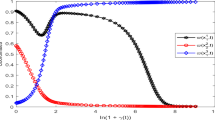Abstract
We show here that a stationary equilibrium in Semi-Markov strategies exists for stochastic games under just the condition of norm continuity of the transition probability that are absolutely continuous with respect to a fixed measure on the state space. We also show that the result can be extended to the case of generalized games in which the feasible action correspondences depend on the action of the other players. We show that the generalization allows one to directly apply the results to general dynamic models.
Similar content being viewed by others
References
Aliprantis, C.D., Border, K.: Infinite Dimensional Analysis: A Hitchiker’s Guide, 3rd edn. Springer-Verlag, Berlin Heidelberg (2005)
Barelli, P., Duggan, J.: A note on semi-Markov perfect equilibrium in discounted stochastic games. J. Econ. Theory 151, 596–604 (2014)
Castaing, C., Valadier, M.: Convex Analysis and Measurable Multifunctions. Springer-Verlag, New York (1977)
Chakrabarti, S.K.: Markov equilibria in discounted stochastic games. J. Econ. Theory 85, 294–327 (1999)
Debreu, G.: A social equilibrium existence theorem. Proc. Natl. Acad. Sci. 38, 886–893 (1952)
Duggan, J.: Noisy Stochastic Games. Econometrica 80, 2017–2045 (2012)
He, W., Sun, Y.: Stationary Markov perfect equilibria in discounted stochastic games. J. Econ. Theory 169, 35–61 (2017)
Jaskiewicz, A., Nowak, A.S.: Stationary almost Markov perfect equilibria in discounted stochastic games. Math. Oper. Res. 41(2), 430–441 (2016)
Hopenhaym, H.: Entry, exit and firm dynamics in long run equilibrium. Econometrica 60, 1127–1150 (1992)
Ichiishi, T.: Game Theory for Economic Analysis. Academic Press, New York (1983)
Klein, E., Thompson, A.C.: Theory of correspondences. Wiley, New York (1984)
Levy, Y.: Discounted Stochastic games with no stationary Nash equilibrium: two examples. Econometrica 81, 1973–2007 (2013)
Levy, Y., Mclennan, A.: Corrigendum to discounted stochastic games with no stationary nash equilibrium: two examples. Econometrica 83, 1237–1252 (2015)
Mertens, J.. F., Measurable, A.: Measurable Choice Theorem. In: Neyman, Sorin (eds.) Stochastic Games and Applications, pp. 107–130. Kluwer Academic Publishers (2003)
Mertens, J.. F., Parthasarathy, T.: Equilibria for discounted stochastic games. In: Neyman, Sorin (eds.) Stochastic Games and Applications, pp. 131–172. Kluwer Academic Publishers (2003)
Mertens, J.F., Parthasarathy, T.: Non-Zero Sum Stochastic Games, Stochastic Games and Related Topics. In: Ragahavan, T.E.S., Ferguson, T.S., Parthasarathy, T., Vrieze, O.J. (Eds.), Kluwer Academic Publishers, Boston (1991)
Nowak, A.: On a new class of nonzero-sum discounted games having stationary Nash equilibrium points. Int. J. Game Theory 32, 121–132 (2003)
Pakes, A., McGuire, P.: Computing Markov-perfect nash equilibria: numerical implications of a dynamic differentiated product model. Rand J. Econ. 25(4), 555–589 (1994)
Pakes, A., McGuire, P.: Stochastic algorithms, symmetric Markov-perfect equilibrium and the curse of dimensionality. Econometrica 69, 1261–1281 (1994)
Parthasarathy, K.R.: Probability Measures on Metric Spaces. Academic Press, New York (1967)
Acknowledgements
Some very early versions of the paper were presented at the University of Rochester, April 2016, Southern Methodist University, November 2017 and the Indian Statistical Institute, New Delhi in July 2018. The author thanks the participants for their comments. The author also thanks Paolo Barelli, Robert Becker, Marcus Berliant, Srihari Govindan, Debashis Mishra, Kevin Reffett, Santanu Roy, Jyoti Sarkar, Arunava Sen and Yeneng Sun for their detailed cpmments and discussions. The paper has been selected for presentation at the 2021 Game Theory Society World Congress. The usual disclaimer applies.
Author information
Authors and Affiliations
Corresponding author
Additional information
Publisher's Note
Springer Nature remains neutral with regard to jurisdictional claims in published maps and institutional affiliations.
Rights and permissions
About this article
Cite this article
Chakrabarti, S.K. Stationary equilibrium in stochastic dynamic models: Semi-Markov strategies. Econ Theory Bull 9, 177–194 (2021). https://doi.org/10.1007/s40505-021-00202-2
Received:
Accepted:
Published:
Issue Date:
DOI: https://doi.org/10.1007/s40505-021-00202-2
Keywords
- Stochastic games
- Markov perfect equilibrium
- Semi-Markov strategies
- Stationary Markov equilibrium
- Subgame perfect equilibrium
- Stationary semi-Markov perfect equilibrium
- Almost Markov perfect equilibrium




